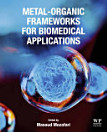Nanoengineered Biomaterials for Regenerative Medicine
Par šo e-grāmatu
Par autoru
Dr. Masoud Mozafari is a Fellow at Lunenfeld Tanenbaum Research Institute, Mount Sinai Health Hospital, University of Toronto. He was previously Assistant Professor and Director of the Bioengineering Lab, at the Nanotechnology and Advanced Materials Department, Materials and Energy Research Center, Cellular and Molecular Research Center, and Department of Tissue Engineering and Regenerative Medicine of the Iran University of Medical Sciences (IUMS), Tehran, Iran. Dr. Mozafari’s research interests range across biomaterials, nanotechnology, and tissue engineering, and he is known for the development of strategies for the treatment of damaged tissues and organs, and controlling biological substances for targeted delivery into the human body. Dr. Mozafari has received several awards, including the Khwarizmi Award and the Julia Polak European Doctorate Award for outstanding translational research contributions to the field of biomaterials. He has also received the WIPO Medal for Inventors from The World Intellectual Property Organization (WIPO), in recognition of his contributions to economic and technological development. Dr. Mozafari is currently working on the editorial board of several journals.
Jayakumar Rajadas is the founder and current Director of the Biomaterials and Advanced Drug Delivery Laboratory(bioAdd) at Stanford University, USA. This center has been involved in transforming biophysical ideas into biomaterial and drug delivery technologies. These technologies include microencapsulation of drugs, vascular grafts, bio-implants, development of small molecule and protein-based drugs, regeneration of nerve and cardiovascular tissues, and wound healing applications. Before moving to Stanford, he served as the founding chair of the Bio-organic and Neurochemistry Division at one of India’s national laboratories, Central Leather Research Institute Chennai, India, where he was responsible for both the organization and management of the division. Dr. Rajadas has published over 160 papers and has an h-index of 22.
David L. Kaplan is Professor and Chair, Department of Biomedical Engineering, at Tufts University, USA. His research focus is on biopolymer engineering to understand structure-function relationships, with emphasis on studies related to self-assembly, biomaterials engineering and functional tissue engineering/regenerative medicine. He has published over 600 peer reviewed papers and edited eight books.






